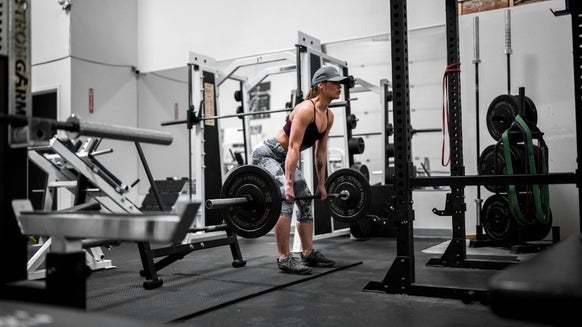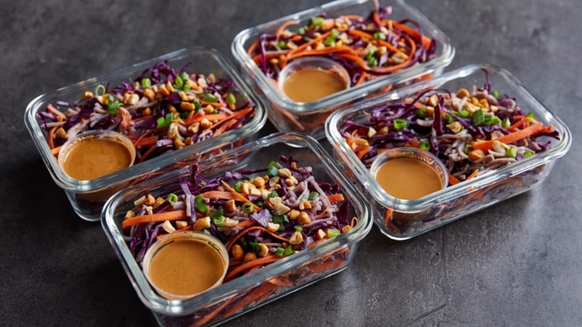
Surprisingly, breakfast has become a bit of a controversial topic recently. Some people, particularly on social media, detest the high-sugar, low-nutrition cereals marketed to young children, while others swear it’s the most important meal of the day.
But let’s avoid the “he said, she said”, and take a fresh look at it with some nutritionist-approved breakfasts to support your goal.
- Why it's important to have a good breakfast
- How breakfast contributes to your fitness goals
- Breakfast ideas for weight management
- Breakfast ideas for lean muscle building
- Breakfast ideas for maintenance
- Breakfast ideas for bulking
Why it’s important to have a good breakfast
I’m going to be completely up front with you — I’m a big fan of breakfast. I know, how very controversial of me. But once you’ve read this article, I’m sure you will be too.
Before anything else, let’s define breakfast. Technically, whatever food you eat that breaks the fast between the last meal of one day and the first meal of the next is breakfast, regardless of whether it’s a small snack or full meal.
There are many reasons why I personally believe breakfast to be important. The arguments range from regulating blood sugar (and therefore energy levels) to reducing the risk of overeating, emotional eating, and binge eating later in the day.1,2
The arguments against it are centred around the suggestion that fasting is an improved means of weight loss (it’s not when compared to a calorie-controlled diet).3
Another argument against breakfast is that it is a significant contributor to weight gain. Evidence on this is mixed, with studies showing evidence for and against this statement.4,5
I mentioned earlier the role social media can play in fuelling anti-breakfast beliefs, and it’s hard not to sympathize with that viewpoint.
You just have to look at the quality of many breakfast cereals. They are often portrayed as the breakfast staples we should be eating most mornings, but most available breakfast cereals (and other popular foods like pancakes, croissants, pastries, etc) can be laden with added sugars and unhealthy fats.
So it’s easy to see why some people have lost faith in breakfast. But breakfast is so much more than these low-quality options.
In my opinion, breakfast should be the fundamental cornerstone of nutrition, fuelling you up first thing, ready to take on the day.
How breakfast can contribute to your fitness goals
Food is the body’s fuel, and each day our bodies face a range of challenges. To ensure your body and brain are functioning at their best, you need the right fuel.
While this doesn’t mean that everyone needs breakfast, as everyone has different preferences and hunger cues.6 But most people would feel better if they had a nutritious breakfast to start the day.
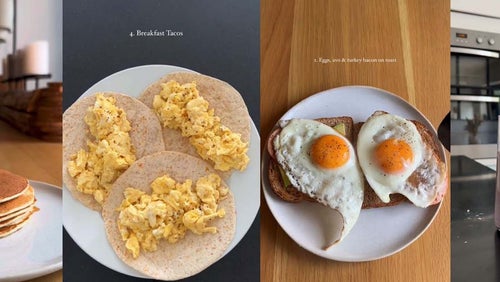
5 High-Protein Muscle-Building Breakfast Recipes
There’s nothing like the thought of waffles to get you out of bed in the morning...
This is especially true for athletes: exercise performance relies on adequate fuelling and skipping breakfast has been shown to negatively affect exercise performance.7,8,9,10
So, here’s how you can achieve your goals with breakfast options that provide the all-important fuel.
11 High-Protein Breakfast Recipes
No more boring breakfasts around here. You deserve better....
Breakfast ideas to meet your goals
Breakfast options for weight management
The aim of any weight management strategy is to achieve a calorie deficit, ensuring weight loss.
Although it may seem counterintuitive (and one of the reasons people recommend fasting), a nutritious meal can be a great first step to achieving a calorie deficit in a day.
As mentioned before, there is evidence showing that skipping breakfast can both work for and against weight loss.4,5 But, for those who struggle to manage their weight, eating breakfast may be the best option.
This has been reflected in several studies looking at both children and adults. Skipping breakfast is associated with a much greater risk of becoming overweight or obese when compared to having breakfast.11,12
So, what do you want in a weight management-focused breakfast?
Beyond getting in plenty of health-promoting vitamins and minerals, a breakfast designed to promote weight loss or management should focus on these three key elements:
- Protein
- Fibre
- Volume
Protein and fibre keep you feeling full for longer, reduce hunger cravings, and help regulate blood glucose.13,14
High-volume foods have a low-energy density, meaning they provide relatively few calories for the quantity of food. They also help manage hunger to support weight management.15
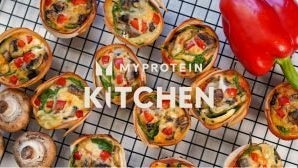
Low-Carb High-Protein Breakfast Cups
Low carb? Check. High protein? Double check. ...
Breakfast options that tick all the boxes
Veggie omelette
Ingredients: egg whites, whole eggs, and choice of vegetables.
- Egg white is rich in protein and the egg yolks provide a range of vitamins, minerals, and healthy fats that can contribute to satiety.
- The vegetables are rich in fibre, as well as vitamins and minerals.
- Egg whites and most vegetables are considered high-volume foods and combine well to promote satiety.
Greek yogurt with berries and chia seeds
Ingredients: Greek yogurt, mixed berries, and chia seeds.
- Greek yogurt is a great source of protein, as are chia seeds.
- Mixed berries and chia seeds provide fibre.
- Yogurt, berries, and chia seeds are all high-volume foods.
- Chia seeds may even absorb some of the liquid and expand, providing even more volume. Prepare the night before to have in the morning, giving the chia seeds even more opportunity to expand.
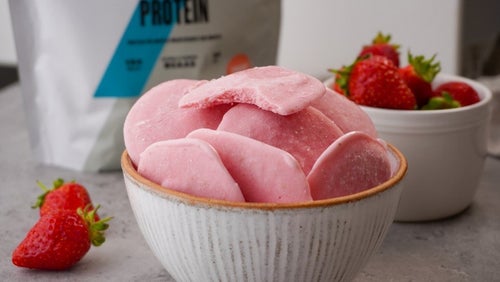
Low-Calorie Strawberry Yogurt Bites
Forget frozen yogurt, we're all about Yo-Yo Bites....
Overnight oats with protein powder
Ingredients: rolled oats and protein powder of choice (chocolate would be a good shout).
- Oats and protein powder provide a significant serving of protein to start the day, with oats also providing plenty of fibre and volume.
- Water or unsweetened plant-based milk alternatives can also be a great way to increase the volume while lowering the energy quantity. You can even add in some mixed berries and/or chia seeds for extra volume.
Breakfasts for building lean muscle
If your aim is to build lean muscle, then you have to factor in three key elements for breakfast.
- Conservative calorie surplus: you need that extra fuel to develop lean muscle mass.
- Fuel for optimum performance: the stimulus to grow new lean muscle comes from working harder.
- High-quality protein: you need all the essential amino acids to promote muscle growth and repair.
Avocado toast with poached eggs
Ingredients: wholegrain bread, avocado, and eggs.
- Contributes towards your energy requirements for muscle growth.
- Bread for carbohydrates to fuel your training while the avocado and eggs help regulate blood glucose levels to support sustained energy release.
- The high-quality protein in the eggs compliments the protein from the bread and provides the building blocks of new muscle.
- You may also add some sea salt for flavour and electrolytes (alongside the minerals found in the bread and avocado) to ensure your muscles function during workouts.
Oats with protein powder and peanut butter
Ingredients: rolled oats, protein powder, and peanut butter.
- Plenty of volume, high-quality protein, and energy to start the day.
- Provides a sustained release of glucose into the bloodstream allowing for more consistent energy levels and the fuel needed for a progressive, intense workout.
Banana and mango post-workout smoothie
Ingredients: banana, mango, protein powder, Greek yogurt, and peanut butter.
- High-quality protein and energy post-workout to fuel recovery and muscle gain.
- Easily digestible carbohydrates to replenish glycogen stores.
- Plenty of electrolytes and fluids for rehydration.
Breakfasts for maintenance
The goal of maintenance is to simply consume about the same amount of energy as you use. The focus is usually on other things such as health or fitness.
Maintenance meals should be based around the following:
- Protein intake.
- Practicality and repeatability: the ease of fitting a meal into your routine will make maintenance easier.
- Adequate fuel: you need plenty of energy to perform at your best.
Overnight oats with chia seeds and berries
Ingredients: rolled oats with a scoop of protein, soaked overnight in almond milk, mixed with chia seeds, topped with fresh berries and a drizzle of honey.
- A sustained release of energy from complex carbohydrates in oats and chia seeds, boosting glycogen stores.
- Protein supports weight maintenance and promotes muscle growth and recovery.
- Fibre aids digestion and satiety, berries provide antioxidants and vitamins for overall health, and honey adds natural sweetness and quick energy.
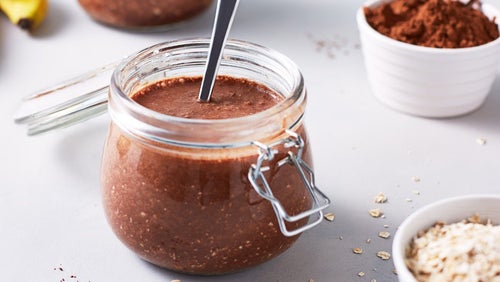
Banana & Chocolate Overnight Oats | Start Your Day Strong
Kill off those chocolate cravings for good....
Wholegrain pancakes with cottage cheese and fruit
Ingredients: pancakes made from wholegrain flour, served with cottage cheese and topped with fresh fruit like strawberries or blueberries.
- Whole grains provide a steady supply of energy through complex carbohydrates.
- Protein in cottage cheese supports muscle repair and maintenance.
- Fresh fruits for essential vitamins, antioxidants, and natural sweetness.
- A well-rounded, nutrient-dense start to the day, promoting muscle health and energy balance.
Spinach and feta omelette with wholegrain bread
Ingredients: spinach, feta, egg whites, whole eggs, and wholegrain bread.
- Eggs provide a high-quality source of protein for muscle maintenance.
- Spinach is rich in iron and vitamins, supporting overall health and muscle function.
- Feta adds flavour and additional protein.
- Wholegrain bread contributes complex carbohydrates for sustained energy.
- A balanced mix of protein, healthy fats, and carbohydrates, suitable for maintaining muscle mass and supporting overall health.
Breakfast options for bulking
The goal of a bulk is not too dissimilar to gaining muscle. The difference is that the magnitude of the gain is more significant, with more openness to gaining body fat through a greater calorie surplus that also supports strength gains.
High-Protein Breakfast Burrito
Ingredients: whole eggs, black beans, cheese, avocado, and wholewheat tortilla.
- Eggs and black beans provide high-quality protein for muscle repair.
- Wholewheat tortilla offers complex carbohydrates for energy replenishment.
- Avocado provides healthy fats and additional fibre.
- A great combination of protein, carbs, and fats to support muscle growth and energy levels.
- Rich in vitamins and minerals, with vitamin E from avocado and B vitamins from whole grains, supporting overall health.
- Energy-dense, supporting weight gain, lean muscle growth, and strength improvement.
Salmon and Avocado Bagel
Ingredients: smoked salmon, cream cheese, avocado, and a wholegrain bagel.
- Salmon is an excellent source of protein and omega-3 fatty acids, crucial for muscle repair.
- The wholegrain bagel provides the necessary carbohydrates for glycogen replenishment, while avocado adds healthy fats and fibre.
- Supports muscle recovery and provides sustained energy.
- Omega-3s from salmon for heart health and cognitive function.
Hearty Steak and Eggs with Whole-Grain Toast
Ingredients: steak, eggs, and whole-grain toast.
- Steak is a high-quality protein source, providing essential amino acids crucial for muscle repair and growth.
- Eggs add extra protein and nutrients.
- Wholegrain toast offers complex carbohydrates for replenishing glycogen stores.
- Combines high protein with complex carbs, aiding in muscle recovery and growth.
- Rich in iron and B vitamins from the steak, supporting overall energy levels and metabolic health.

Take home message
There may be some split opinions on breakfast, but as you can see, there are plenty of nutritious, delicious, healthy options for a morning meal.
Done correctly, breakfast can be an incredibly valuable cornerstone of a successful nutrition plan, filling you up and fuelling you for the day.
READ THESE NEXT:
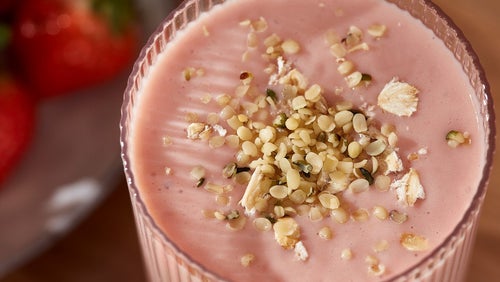
Protein Shakes For Weight Loss
Here's how to use protein shakes to your advantage....

How To Build Muscle | 9 Top Supplements For Bulking
Need a helping hand to make those extra gains?...

Essential Amino Acids | Everything You Need To Know
Find out more about this “essential” ingredient that makes protein so powerful....

- Maki KC, Phillips-Eakley AK, Smith KN. The Effects of Breakfast Consumption and Composition on Metabolic Wellness with a Focus on Carbohydrate Metabolism. Adv Nutr. 2016 May 16;7(3):613S-21S. doi: 10.3945/an.115.010314. PMID: 27184288; PMCID: PMC4863265.
- Masheb RM, Grilo CM. Eating patterns and breakfast consumption in obese patients with binge eating disorder. Behav Res Ther. 2006 Nov;44(11):1545-53. doi: 10.1016/j.brat.2005.10.013. Epub 2005 Dec 22. PMID: 16376851.
- Ezzati A, Rosenkranz SK, Phelan J, Logan C. The Effects of Isocaloric Intermittent Fasting vs Daily Caloric Restriction on Weight Loss and Metabolic Risk Factors for Noncommunicable Chronic Diseases: A Systematic Review of Randomized Controlled or Comparative Trials. J Acad Nutr Diet. 2023 Feb;123(2):318-329.e1. doi: 10.1016/j.jand.2022.09.013. Epub 2022 Sep 17. PMID: 36126910.
- Sievert K, Hussain S M, Page M J, Wang Y, Hughes H J, Malek M et al. Effect of breakfast on weight and energy intake: systematic review and meta-analysis of randomized controlled trials BMJ 2019; 364 :l42 doi:10.1136/bmj.l42
- Lopez-Minguez J, Gómez-Abellán P, Garaulet M. Timing of Breakfast, Lunch, and Dinner. Effects on Obesity and Metabolic Risk. Nutrients. 2019 Nov 1;11(11):2624. doi: 10.3390/nu11112624. PMID: 31684003; PMCID: PMC6893547.
- Gentry NW, Ashbrook LH, Fu YH, Ptáček LJ. Human circadian variations. J Clin Invest. 2021 Aug 16;131(16):e148282. doi: 10.1172/JCI148282. PMID: 34396981; PMCID: PMC8363277.
- Bin Naharudin, Mohamed Nashrudin1,2; Yusof, Ashril2; Shaw, Harry1; Stockton, Matthew1; Clayton, David J.3; James, Lewis J.1. Breakfast Omission Reduces Subsequent Resistance Exercise Performance. Journal of Strength and Conditioning Research 33(7):p 1766-1772, July 2019. | DOI: 10.1519/JSC.0000000000003054
- Clayton DJ, James LJ. The effect of breakfast on appetite regulation, energy balance and exercise performance. Proc Nutr Soc. 2016 Aug;75(3):319-27. doi: 10.1017/S0029665115004243. Epub 2015 Dec 14. PMID: 26653842.
- CLAYTON, D.J., BARUTCU, A., MACHIN, C., STENSEL, D.J. and JAMES, L.J. (2015). Effect of Breakfast Omission on Energy Intake and Evening Exercise Performance. Medicine & Science in Sports & Exercise, 47(12), pp.2645–2652. doi:https://doi.org/10.1249/mss.0000000000000702.
- Cornford, E. and Metcalfe, R. (2018). Omission of carbohydrate-rich breakfast impairs evening 2000-m rowing time trial performance. European Journal of Sport Science, 19(1), pp.133–140. doi:https://doi.org/10.1080/17461391.2018.1545052.
- Ma X, Chen Q, Pu Y, Guo M, Jiang Z, Huang W, Long Y, Xu Y. Skipping breakfast is associated with overweight and obesity: A systematic review and meta-analysis. Obes Res Clin Pract. 2020 Jan-Feb;14(1):1-8. doi: 10.1016/j.orcp.2019.12.002. Epub 2020 Jan 7. PMID: 31918985.
- Wang, K., Niu, Y., Zeng Lü, Boyang Duo, Clement Yaw Effah and Guan, L. (2023). The effect of breakfast on childhood obesity: a systematic review and meta-analysis. Frontiers in Nutrition, [online] 10. doi:https://doi.org/10.3389/fnut.2023.1222536.
- Moon J, Koh G. Clinical Evidence and Mechanisms of High-Protein Diet-Induced Weight Loss. J Obes Metab Syndr. 2020 Sep 30;29(3):166-173. doi: 10.7570/jomes20028. PMID: 32699189; PMCID: PMC7539343.
- Skye Waddell & Caroline Orfila (2023) Dietary fiber in the prevention of obesity and obesity-related chronic diseases: From epidemiological evidence to potential molecular mechanisms, Critical Reviews in Food Science and Nutrition, 63:27, 8752-8767, DOI: 10.1080/10408398.2022.2061909
- Stelmach-Mardas M, Rodacki T, Dobrowolska-Iwanek J, Brzozowska A, Walkowiak J, Wojtanowska-Krosniak A, Zagrodzki P, Bechthold A, Mardas M, Boeing H. Link between Food Energy Density and Body Weight Changes in Obese Adults. Nutrients. 2016 Apr 20;8(4):229. doi: 10.3390/nu8040229. PMID: 27104562; PMCID: PMC4848697.





